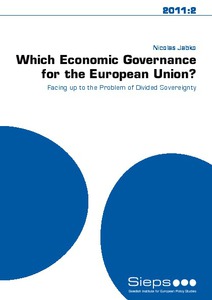Which economic governance for the European Union? Facing up to the problem of divided sovereignty
"Sovereignty over the Economic and Monetary Union, EMU, is divided. Monetary policy is unified at the European level while economic policy is in essence national. The debate on how the economic part of the EMU could be given a content so as to prevent future crises has been re-ignited during th...
| Main Author: | |
|---|---|
| Institution: | ETUI-European Trade Union Institute |
| Format: | TEXT |
| Language: | English |
| Published: |
Stockholm
2011
SIEPS |
| Subjects: | |
| Online Access: | https://www.labourline.org/KENTIKA-19177586124919957689-Which-economic-governance-for-.htm |
| _version_ | 1771659894439542786 |
|---|---|
| author | Jabko, Nicolas |
| author_facet | Jabko, Nicolas |
| collection | Library items |
| description | "Sovereignty over the Economic and Monetary Union, EMU, is divided. Monetary policy is unified at the European level while economic policy is in essence national. The debate on how the economic part of the EMU could be given a content so as to prevent future crises has been re-ignited during the very turbulent period with banking and debt crises. Presently the process is at a critical juncture and the decisions made may have far reaching consequences also for non-Euro countries like Sweden. At the seminar on 21 March Professor Nicolas Jabko will present a new report where he analyses the ideas of a gouvernement économique and outlines the measures which have been discussed and implemented. He identifies three central problems – or boundary conditions – which dictates guidelines for stronger economic governance in the short term. First, the member states are not willing to approve any kind of transfer union. This dictates that member states must find better ways to enlist the support of financial markets for debt consolidation and financial discipline. Second, the member states are reluctant to delegate more power to Brussels. This implies, according to Jabko, that the debt consolidation framework must be externalized to non-EU bodies or independent European agencies as much as possible. Third, the member states are reluctant to see their autonomy curtailed. A new economic governance framework must therefore give as much say to the governments in the decision-making process. In the long run, a need to rebalance the divided sovereignty within the EU is almost certain to emerge." |
| format | TEXT |
| geographic | EU countries |
| id | 19177586124919957689_ac51eb5c3912496299a321978286ba96 |
| institution | ETUI-European Trade Union Institute |
| is_hierarchy_id | 19177586124919957689_ac51eb5c3912496299a321978286ba96 |
| is_hierarchy_title | Which economic governance for the European Union? Facing up to the problem of divided sovereignty |
| language | English |
| physical | 76 p. Digital |
| publishDate | 2011 |
| publisher | Stockholm SIEPS |
| spellingShingle | Jabko, Nicolas economic policy EMU European Union governance Which economic governance for the European Union? Facing up to the problem of divided sovereignty |
| thumbnail | https://www.labourline.org/Image_prev.jpg?Archive=114532493271 |
| title | Which economic governance for the European Union? Facing up to the problem of divided sovereignty |
| topic | economic policy EMU European Union governance |
| url | https://www.labourline.org/KENTIKA-19177586124919957689-Which-economic-governance-for-.htm |

